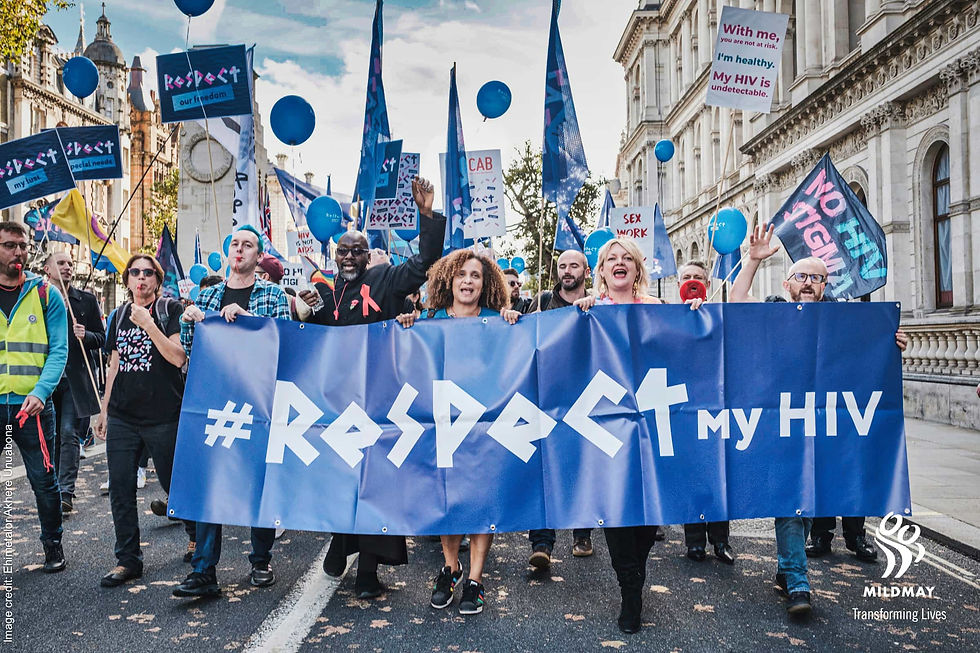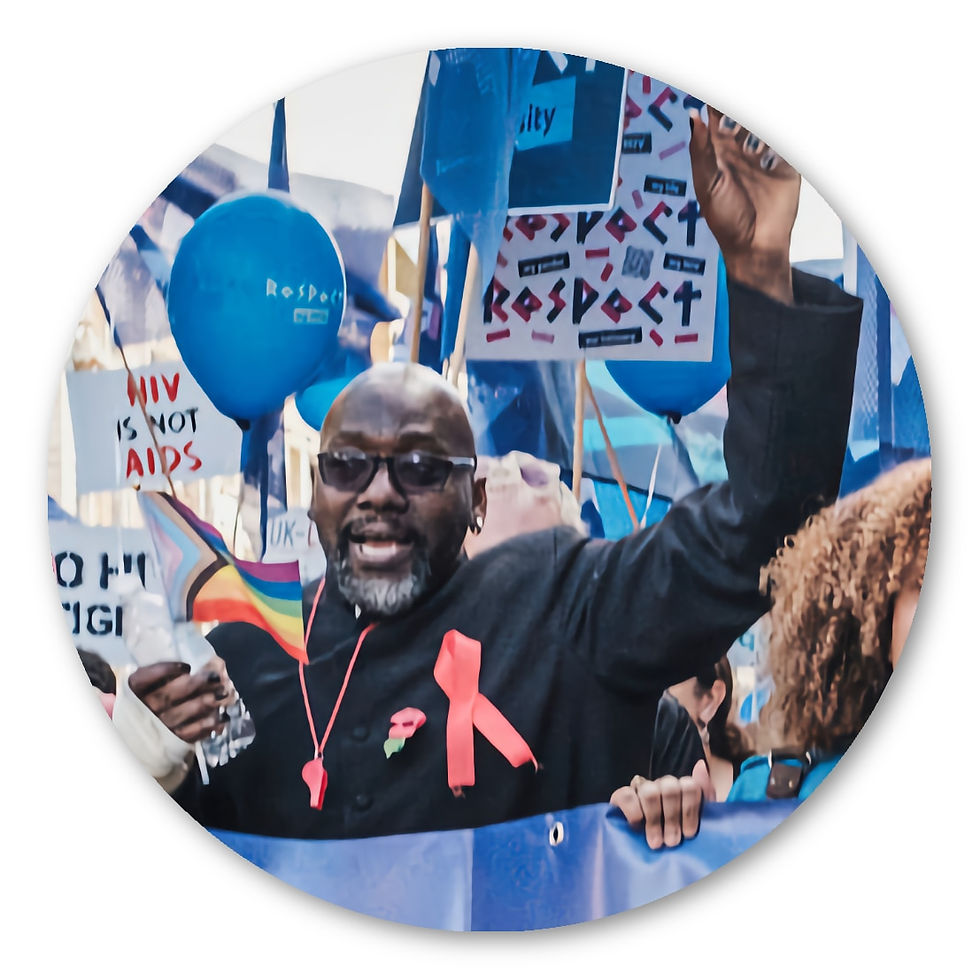A letter to … the HIV that is in my bloodstream
- Oct 31, 2022
- 6 min read

What is it really like living with HIV?
The reality is, people with HIV can be in relationships, have sex, and live normal lives by taking a few precautions. Although there's no cure for HIV, there are medicines that help people with HIV live longer, healthier lives. As long as they follow their treatment plans, most people with HIV can enjoy full social and professional lives. In fact, those who receive an early diagnosis and effective treatment can expect to live nearly as long as individuals who have not contracted the virus.
Living with HIV is a far more subtle and complex thing than the bald statement above might suggest. The testimony given below by Jacob Boehme beautifully illustrates the complex, human, relationship that people have with this disease.
Reproduced from Al Jazeera, with kind permission:
‘In many ways, you have radically changed me. But in many others, you have not.’
I’ve been living with you since 1998 – that’s 24 years now. In many ways, you have radically changed me. But funnily enough, in many other ways you have not.
These days, you are only one aspect of my identity, of which there are many parts:
I’m a fair-skinned, Aboriginal gay man who hails from Nganarunga and Kaurna country in south Australia with Scottish and Finnish heritage.
I’m a ‘westie’ – I grew up in the western suburbs of Melbourne.
I’m a dancer, a theatre maker, a husband, a festival director, an uncle.
A good part of me is also very queer.
I remember the day I found out about you. It was the 28th of October.
Most of us have the date when we were diagnosed imprinted in our minds.
It’s like there is life pre-you and then life living with you.
I remember walking down to the doctor’s, and as I walked, with each footstep was a “no”. It was just “No, no, no. No.”
But I already knew the answer even before I heard the doctor’s results.
I’d had a cold for some weeks that just wouldn’t go away. One of my dance teachers told me I should get it checked. But two of the traditional Aboriginal teachers sat me down and began to sing over me, like in the traditional healing way.
They sang over me, and when they finished, one of them, Aunty Peggy, turned around and said: “We can’t help you, you need Western medicine, everything is red.” That’s when I went to the doctor.
When I got to the doctor, it was really strange. He was going through a list of other sexually transmitted diseases (STDs), saying that I did not have them. Eventually I said: “Just tell me.”
That’s when he broke down, and got all teary. “I’ve never had to do this before,” he said. I had to put him out of his misery, so I said, “It came back positive, didn’t it?”
“Yes,” he said.
I started laughing. That was my first reaction. All I could think was: “Really? Really? Now this? Are you kidding me?”
After leaving the doctor’s I went straight to the pub. I had a vodka shot with a beer chaser.
‘I’m going to die’
At first, being diagnosed with you was all-consuming. Initially, all I thought was “Oh my God, I am going to die.”
As a teenager, I associated being gay with getting AIDS. That was the media conversation at the time – homosexuals and AIDS. So I just equated my early youth and awakening queer sexuality with “at some point I’m going to get AIDS and die.”
I grew up with that thought at the back of my mind. So when I was diagnosed in my 20s, it was almost like a self-fulfilling prophecy.
The other thought that haunted me was: “No one will ever love me, I will never find love, I’m no longer loveable, I’m dirty, I’m going to die alone.”
When I was first diagnosed, it would take all my courage to tell somebody I was starting a relationship with, that I was living with you.
It really didn’t work out.
The rejections would come. Some were quite swift, which was easier to deal with than the slow, painful withdrawal, where sex would start to wane over time, until it was off the table, and all they would want to do is hold hands.
That’s painful to go through.
As I got older and learned to live with you inside my body, I became much more upfront with people I was dating. I also preferred to go on dates with other men who were living with you too, because it was less drama.
I want you to know that – despite the stigma of you being in my system – I did manage to find love.
My husband lives with you too.
I didn’t know this at the beginning. We really liked each other. But once we had the fact of you out in the open, we had a shared experience that we could connect to.
But our whole relationship is not just about you – that would be boring and toxic.
A daily reminder of you
Along with the difficulties in finding a relationship and living with the stigma of you, the biggest challenge of having you in my body is taking the medication every day.
When I was first diagnosed, I was put on pills that were quite strong.
When I took those pills, I went back into dance class. Normally – pre-you – I’d be the last person standing. Yet on those pills I would overheat in 10 minutes and have to run to the toilet to vomit.
So we started to find a medication regimen that I could take that didn’t disrupt my day.
I knew other people who had to take pills at numerous and very specific times of the day, but I didn’t want a medication regimen that ruled my life.
I just wanted the doctor to find medication that I could take either in the morning or the night and just get on with my day.
And so that’s what I’ve been on ever since. I take a bunch of pills in the morning and off I go.
The biggest thing is the psychology of it.
Every morning I take those pills it’s a daily reminder of living with you.
Initially that used to really mess with my mind. Every morning I’d think “I’m dirty, diseased.”
Until there was a flip in the psychology where I thought, “actually, without these, I’m dead.”
As I get older, though, I worry about the long-term impact the medication is having on my body and also the risks associated with living with you as an older man.
I’m 48 now. And I’ve been taking medication since 2006.
‘I’ve lived with you longer than I’ve not’
My concerns are about the long-term effects of being on medication and other comorbidities that might occur in my body for being on medication for such a long period of time.
Please go easy on me – don’t give me blindness and don’t give me dementia. Just go about your business but please don’t touch my brain or my eyes.
Those are the thoughts and questions I have now. What do I need to look out for after being exposed to this kind of powerful cocktail of drugs for such a long time?
Sometimes, I wish I could wake up in the morning and just not have to worry about you.
What would be lovely is not to have to take these pills every morning.
I was thinking this only recently. I was taking my pills one Saturday morning and I thought, “I wonder if I will be alive when they finally find a cure? And you can take the pill that cures it from your system?” But the funniest thought was, “And then what; what am I going to do?”
It’s funny because if I ever were to live without you, I’d have to grieve that. Because you have been such a big part of my life; I’ve lived with you longer than I’ve not.
It would be a loss of part of who I am. Because it has been a part of me. So it would have to be saying goodbye to something.
Despite all this, I have learned to live with you to the point where it barely registers as being part of my identity.
Every now and then, I will get those little wake-ups, those little moments of clarity and reflection, where I think about how I am still here and remind myself to be grateful for everything I have got – and to remain grateful for the day.
And that is because of you.
Because the one thing you start to face with your own mortality, while taking those pills every morning, is the fact that you don’t have a lot of time.
So where is the next bit of joy coming from? Where is the next challenge coming from? What is the next mountain I want to climb?
As told to Ali MC by Jacob Boehme

The cover image by Ehimetalor Akhere Unuabona, is of a Respect my HIV Protest in London. Right in the front row is former volunteer chaplain and close friend of Mildmay, Reverend Jide Macaulay. Hi Jide!









